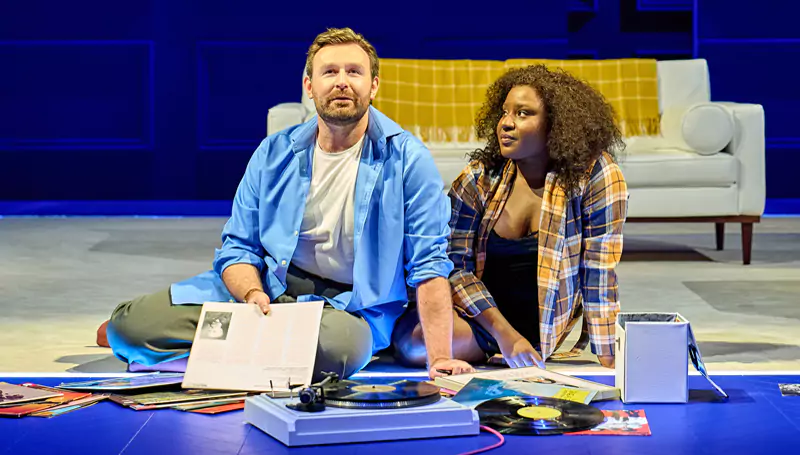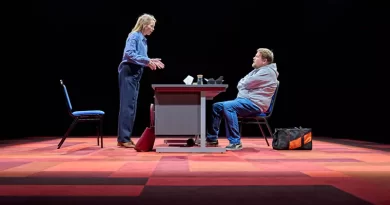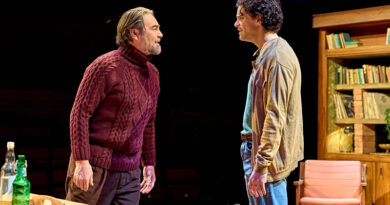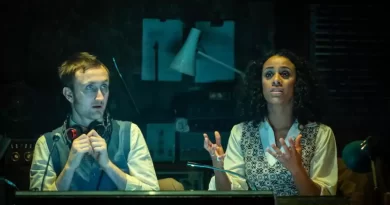“The Real Thing” at the Old Vic
Neil Dowden on the South Bank
14 September 2024
First staged in 1982, The Real Thing is deservedly one of Tom Stoppard’s most revived works. As well as dealing entertainingly with serious issues of truth in relationships and art with his usual intellectual wit, the play ultimately attains an uncharacteristic emotional engagement. Max Webster’s sparkling new production at the Old Vic (where there was also a revival in 2010 by Anna Mackmin starring Toby Stephens and Hattie Morahan) achieves just the right balance of playfulness and feeling.

Bel Powley and Rilwan Abiola Owokoniran.
Photo credit: Manuel Harlan.
The Real Thing starts with a metatheatrical flourish. In an edgily comic opening scene, we see a man apparently catch out his wife in committing adultery – she claims to have gone to Switzerland for work but she has left her passport at home. However, in the following scene we realize they are actors Charlotte and Max in a play called ‘House of Cards’ written by Charlotte’s actual husband Henry, who it quickly transpires is having a real-life affair with Max’s wife Annie (also an actress) – though they put on an act of disliking each other to conceal their mutual attraction. The play within a play nicely sets up the work’s dichotomy of appearance and reality, while the marital infidelity is motivated by love rather than lust.
Two years later Henry and Annie are living together, but he is unable to write convincingly about his love for her. Meanwhile, she campaigns on behalf of former Scottish soldier Brodie who has been imprisoned for setting fire to a wreath on the Tomb of the Unknown Soldier. Annie persuades the supercilious Henry to rewrite Brodie’s passionate but amateurish agitprop TV drama (with Henry memorably comparing their respective writing to hitting a ball with a cricket bat rather than a plank of wood) – though both Annie and Brodie’s motivations prove to be suspect. And then, in a confrontation that echoes his own play in the first scene, Henry accuses Annie of being unfaithful with her young co-star Billy in ’Tis Pity She’s a Whore while away performing in a theatre in Glasgow. Perhaps the pain he feels over this is the “real thing”?
Stoppard is often charged with writing brilliantly inventive and funny plays that fail to touch the heart. But here – possibly with the playwright Henry as an alter ego – he makes someone struggling to express their emotions undergo an emotional journey. As a writer, Henry tends to distance himself from direct feeling as he tries to make creative use of personal experiences – but the resulting tension causes him to break down. (Adding another layer is the fact that Stoppard had an affair with Felicity Kendal who starred in the original production of The Real Thing – though that was about a decade later.)
Webster accentuates the meta in his period revival, with stage hands very visibly taking props on and off stage, pushing a dangling light bulb to create an unsettling effect, and even playing to the audience with a few dance moves – perhaps stretching it a bit too far. Peter McKintosh’s flexible design features cardboard boxes that suggest a constantly shifting reality and a sofa that becomes shared seating in a train carriage. The show is punctuated by a mixture of classical music and pop songs that appear to be coming from a record player at the front of the stage, prompted by Henry’s upcoming choice for his appearance on Desert Island Discs. (At one point Henry, with typically humorous provocation, claims that Bach’s “Air on the G String” is “lifted” from Procol Harum’s “A Whiter Shade of Pale”.)
James McArdle gives a superb performance as the self-absorbed Henry, showing how his cynical humour masks an inner insecurity which later develops into jealous doubts as he finally commits himself emotionally to Bel Powley’s independent Annie, who wants more of an open relationship. Susan Wokoma gets big laughs as the feisty Charlotte, while Oliver Johnstone’s Max eventually moves on from his angry sense of betrayal. Karise Yansen makes an amusing impact as Henry and Charlotte’s rebelliously precocious teenage daughter Debbie who believes that love is just a form of colonization. Rilwan Abiola Owokoniran is the attractively flirtatious Billy and Jack Ambrose makes a strong professional stage debut as the aggressively attention-seeking Brodie who turns out to be not what he seems.









